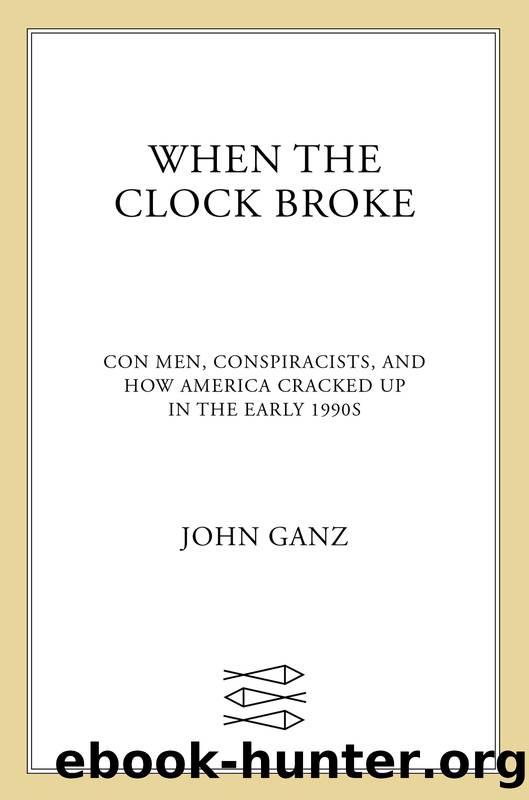When the Clock Broke by John Ganz

Author:John Ganz
Language: eng
Format: epub
Publisher: Farrar, Straus and Giroux
9
âWEâRE AT WARâ
What was to be done about Jesse Jackson and the Rainbow Coalition? Although the reverend chose not to run in â92, that was more a sign of the widespread belief among Democrats that it was a âbad yearâ than any real decline in his political career.
Jackson retained his position as the major broker for two key centers of Democratic power: Black voters and unreconstructed New Deal liberals. The candidates in the race did a complicated dance around Jackson, approaching and avoiding as their political needs required. An approach could be hazardous: Jerry Brown found that out in New York whenâto Howard Sternâs disgustâhe floated Jackson as a vice presidential candidate. But there were risks in keeping oneâs distance as well.
Clinton had kept a degree of remove from Jackson, but when he was toldâerroneously, in factâthat Jackson had endorsed Tom Harkin during a February TV interview, he had one of his tantrums. âItâs an outrage. Itâs a dirty double-crossing, back-stabbing thing to do,â Clinton exploded to his aides, thinking he was off the air. âThereâs only one person can be hurt by this ⦠I mean, I want you to say, listen, I came to that guyâs house at midnight. I have called him, Iâve done everything I could. For him to do this ⦠For me to hear this on a television program is an act of absolute dishonor.â But the most revealing comment perhaps was âThat is not what we want. We want him not involved at all.â Clinton was trying to arrange a non-endorsement from Jackson, with the understanding that he also would not endorse anyone else.
The press lapped up the gaffe. Columnists even celebrated the outburst. Bill Thompson of the Fort Worth Star-Telegram applauded Clintonâs âspontaneity,â âhonest emotion,â âimpromptu anger.â Thompson wrote that the affair really reflected more on Jackson than on Clinton: âIf this was Clintonâs immediate reaction to what he thought was a double-cross by Jackson, perhaps we could draw a conclusion: Perhaps Bill Clinton knows, or at least suspects, that Jesse Jackson is a double-crossing backstabber. Clinton seemed angry. He didnât seem surprised.â There were gains to be had in attacking Jackson: an appreciative audience in the press. Inside the Democratic Party, especially in the South, other voices were urging Clinton to go after Jackson. A party activist and fundraiser told Clinton that he could benefit by âtelling old Jesse where to stuff it.â
From a certain perspective, the Democratic Leadership Council was a coalition of anti-Jackson Democrats. It was founded in 1985, right after Mondaleâs general election loss and Jacksonâs surprisingly strong primary campaign and keynote speech at the 1984 Democratic Convention. The New Democrats, as the DLC members came to be known, blamed Jackson and the liberals for the catastrophic losses by Mondale and then Dukakis. William Galstonâs postmortem identified the Democratsâ âliberal fundamentalismâ and catering to minority groups as their fatal flaw. Jackson quickly understood the nature of the group and returned the favor, calling them âDemocrats for the Leisure Class.
Download
This site does not store any files on its server. We only index and link to content provided by other sites. Please contact the content providers to delete copyright contents if any and email us, we'll remove relevant links or contents immediately.
| Anarchism | Communism & Socialism |
| Conservatism & Liberalism | Democracy |
| Fascism | Libertarianism |
| Nationalism | Radicalism |
| Utopian |
The Secret History by Donna Tartt(19089)
The Social Justice Warrior Handbook by Lisa De Pasquale(12190)
Thirteen Reasons Why by Jay Asher(8910)
This Is How You Lose Her by Junot Diaz(6887)
Weapons of Math Destruction by Cathy O'Neil(6281)
Zero to One by Peter Thiel(5802)
Beartown by Fredrik Backman(5754)
The Myth of the Strong Leader by Archie Brown(5508)
The Fire Next Time by James Baldwin(5446)
How Democracies Die by Steven Levitsky & Daniel Ziblatt(5219)
Promise Me, Dad by Joe Biden(5153)
Stone's Rules by Roger Stone(5088)
A Higher Loyalty: Truth, Lies, and Leadership by James Comey(4964)
100 Deadly Skills by Clint Emerson(4925)
Rise and Kill First by Ronen Bergman(4789)
Secrecy World by Jake Bernstein(4753)
The David Icke Guide to the Global Conspiracy (and how to end it) by David Icke(4720)
The Farm by Tom Rob Smith(4513)
The Doomsday Machine by Daniel Ellsberg(4490)
